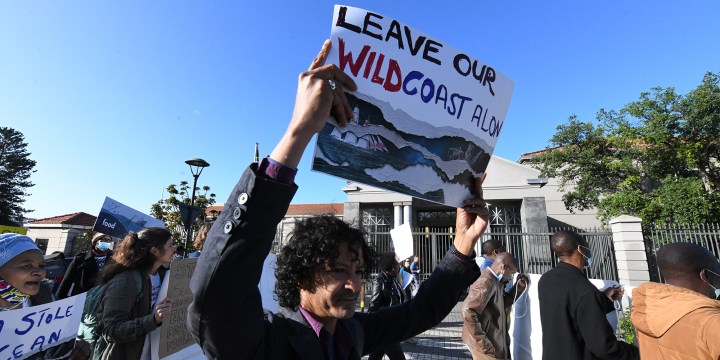SEISMIC SURVEYS
Shell, Impact Africa and Mantashe fight order to halt Wild Coast oil and gas exploration

Coastal communities and NGOs must return to court as Shell, Impact Africa and the Minister of Mineral Resources and Energy Gwede Mantashe seek leave to appeal against the judgment that stopped oil and gas exploration off the ecologically sensitive Wild Coast.
On 20 September 2022, Impact Africa lodged an application for leave to appeal against the Makhanda High Court ruling that set aside oil and gas exploration rights. Shell and Minister of Mineral Resources and Energy Gwede Mantashe lodged similar applications on Thursday, 22 September.
Now, the Wild Coast communities and environmental NGOs that recently won the landmark judgment will return to court to defend the environment once again.
The application was brought by Wild Coast residents and fishers, the Dwesa-Cwebe Communal Property Association, and the NGOs Sustaining the Wild Coast NPC and All Rise Attorneys, who were represented by the Legal Resources Centre and Richard Spoor Attorneys.
They were joined by Natural Justice and Greenpeace Africa, represented by environmental law firm Cullinan and Associates, which had launched the first application to interdict the seismic survey.
The court commended Natural Justice and Greenpeace Africa for joining this litigation rather than continuing with separate review proceedings, as they were entitled to do.
Appeal on various grounds
In their application, Shell, Impact Africa and Mantashe are seeking leave to appeal on various grounds.
They argue that the public had been properly notified of the decision to grant the exploration right and that the court should not have allowed the decision to be challenged so long after it was made.
They also argue that the court was wrong to deal with exploration as a step in a single process that culminates in the production and combustion of oil and gas, and was incorrect in applying the precautionary principle to the expert evidence on the harms of seismic surveys.
Shell also argues that the court was wrong to conclude that the public statements made by Mantashe gave rise to a reasonable apprehension of bias, and that lodging an appeal with him would have been an exercise in futility.
Judgment ‘internationally recognised’
In a statement on Thursday, Natural Justice and Greenpeace Africa said the tightly reasoned 1 September judgment by three judges of the Eastern Cape High Court had been internationally recognised as a resounding victory for social and environmental justice.
“The judges found that the granting of the exploration right and its implications had not been made known to affected communities, and that the mere ticking of a checklist did not constitute meaningful consultation.
“The court set aside the decision to grant the exploration right on the basis that it was procedurally unfair, but also noted that it failed to pass muster on several other grounds, including the failure to take account of relevant information, including climate change and the right to food, a failure to take account of the Integrated Coastal Management Act, and the failure to comply with various legal requirements such as the requirement to create opportunities for historically disadvantaged people to participate in the minerals and petroleum industries,” read the statement.
The organisations said that the court found that the Department of Minerals and Energy had failed to consider the communities’ spiritual and cultural rights and their rights to livelihood, the potential climate change implications, and the anticipated harm to marine and bird life along the Eastern Cape coast.
It held that Impact and Shell bore the onus of showing that the precautionary principle should not be applied when experts differed on whether the adverse impacts of the seismic surveys were adequately mitigated.
“In short, the court found in favour of the applicants on all the grounds of review,” said the groups.
They said the judgment put paid to allegations that the communities are simply anti-development, and drew attention to the fact that a proper assessment of whether such oil and gas exploration was needed and desirable had not been done, and the claimed benefits were unsubstantiated.
“It found no detail to substantiate these claims, no explanation as to how the jobs will be created, how the economy will be stimulated, or how the seismic survey will improve socioeconomic circumstances in which most South Africans live.”
‘Dangerous and irresponsible’
Cullinan and Associates director, Cormac Cullinan, said the high court judgment found Mantashe to be biased in favour of the oil and gas industry.
“Shell, Impact Africa and Minister Gwede Mantashe want leave to appeal so that they can continue investing in increasing South Africa’s reliance on fossil fuels and exacerbate the climate emergency.
“It is dangerous and irresponsible to continue with activities that drive climate change and will contribute to untold suffering in Africa,” he said.
Cullinan quoted UN Secretary-General António Guterres, who stated in April this year that “we are on a fast track to climate disaster… This is not fiction or exaggeration. It is what science tells us will result from our current energy policies…
“Some government and business leaders are saying one thing, but doing another. Simply put, they are lying. And the results will be catastrophic. This is a climate emergency.”
Visit Daily Maverick’s home page for more news, analysis and investigations
Cullinan said they were confident that their team of advocates and the combined efforts of the attorneys of Cullinan and Associates, the Legal Resources Centre and Richard Spoor and Co would successfully resist this further attempt to “legitimise harm” to human and ecological communities of the Wild Coast in the pursuit of fossil fuels.
Cullinan said that “if we want to see the end of load shedding, we cannot wait more than a decade for costly, harmful mega-projects to come onstream. Energy modelling proves that renewables are the quickest and cheapest way to get much-needed capacity on to the grid.
“The South African economy cannot afford more investment in wholly unnecessary fossil fuel infrastructure destined to become stranded assets.”
Marine life
Cullinan and Associates attorney Ricky Stone said seismic blasting poses an immediate threat to South Africa’s rich marine life, but the eventual extraction and use of oil and gas likely to follow such exploration will have even more profound impacts.
“It would be critical to focus instead on renewable and natural energy sources and leave the oil in the ground and the gas beneath the sea,” said Stone.
Delme Cupido, southern Africa Hub Director for Natural Justice, said it was disappointing that the regulator — Gwede Mantashe — had chosen to appeal against the historic judgment of a full bench of the high court which recognised and affirmed the rights of communities to be properly consulted on developments that will impact on their livelihoods, food security and cultural and spiritual rights.
‘Disregard for lives and rights’
“Aside from the known devastating impacts of climate change, the potentially irreparable harm to marine and bird life, and the failure to consider the applicable legislation, Shell, Impact Africa and Minister Mantashe are intent on disregarding the lives and the rights of the local and indigenous communities who are waging this battle on behalf of all of us, and for the future of our planet,” said Cupido.
Greenpeace Africa Climate and Energy Campaigner Thandile Chinyavanhu said “Greenpeace Africa is disappointed that Minister Mantashe has made his bias clear: he is on the side of profit, not people. Seismic blasting off the Wild Coast will only destroy the lives and livelihoods of the people who live there.”
Chinyavanhu said it was delusional to think that fossil fuels would save unemployed South Africans, solve the energy crisis or provide decent employment for the people of South Africa.
“In reality, extracting more fossil fuels will only drive us deeper into the climate crisis. A just transition to renewable energy is the best and most immediate solution to South Africa’s problems. We will continue to resist the lies peddled by fossil fuel companies, in and out of the courts,” said Chinyavanhu. DM/OBP





















Why is the Minister of Forestry, Fisheries and the Environment not involved in this matter? – conspicious by her absence. Time for South Africans to boikot Shell products.
Gwede intrigues me. SA has some of the best sustainable power products worldwide in solar, and instead of leading the charge he is continuously fighting for the non sustainable, old and dirty power options. Wouldn’t it be great to have some forward looking leadership in this country instead of constantly fighting old dinosaurs…
Mantashe is the epitome of ANC gone wrong. Self serving, greedy, lack of feeling for the people and their legacy. Hamba u skebenga, hamba.